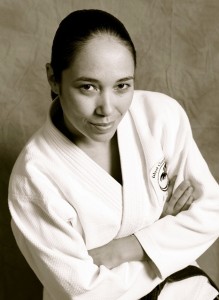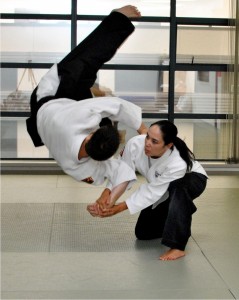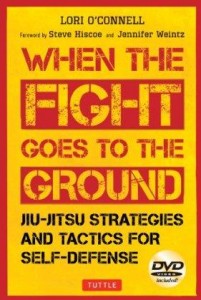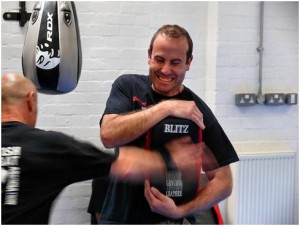Lori O’Connell is a 5th Dan Jiu Jitsu expert and respected author with her second book on the way. Having studied a wide range of martial arts  she has a deep and broad knowledge of all areas of self defence. Unlike many other teachers, she has the experience to know what will work in the street as opposed to what works in the ring with a referee in control.
she has a deep and broad knowledge of all areas of self defence. Unlike many other teachers, she has the experience to know what will work in the street as opposed to what works in the ring with a referee in control.
Being quite petite, she is the first to admit that she does not have size or strength on her side, but she makes up for this with technique and tenacity. I have been very lucky and honoured to secure an interview with this busy lady and I will be reviewing her new book when it comes out next month.
So, over to the interview:
CW: Lori; martial arts are different things to different people, (sport, self defence, self development, fitness, etc). What are the most important aspects of martial arts to you and which aspects do you emphasis most in your teaching?
LO’C: Self-defense, self-development, and fitness.
CW: Please tell us how you first got into martial arts and what style(s) did you originally started with?
LO’C: I started with Can-ryu Jiu-jitsu, the style I continue to teach today, but I have trained in a number of other arts over the years. I first got into it at the age of 16 partly for self-defense, but also because I wanted to be a “strong woman” like so many movie heroines that were in movies in the 90s that had made an impression on me.
CW: You’ve practiced a number of other different styles along the way, apart from Can Ryu Jiu Jitsu. I’ve always found that when I practice other styles, I usually end up learning more about my own core style (Shotokan Karate). Do you find that you learn more about your core style of Jiu Jitsu, or do you find some of them completely different?
LO’C: I’m like you. I’ve found takeaways in all the different other arts I’ve studied that helped me improve in my own style. There is so much to learn from all the arts. Why limit yourself only to what is taught in your own style?
CW: Please list the other styles that you’ve practiced and tell us which of them have had the most influence on you? Have you taken aspects of some of those other styles back into your Can Ryu Jiu Jitsu teaching?
LO’C: Shotokan Karate, boxing, MMA, Aikido, Taichi, Taekwondo/Hapkido, Wushu, several other styles of Jiu-jitsu. These are only the ones that I studies for 6 months or longer, most of them I trained in for at least 1 or more years.
 CW: Having practiced so many different styles, what is it about Can Ryu Jiu Jitsu that particularly appealed to you to keep it as your primary style for many years?
CW: Having practiced so many different styles, what is it about Can Ryu Jiu Jitsu that particularly appealed to you to keep it as your primary style for many years?
LO’C: I like Can-ryu’s self-defense emphasis. We don’t do competition and emphasize using self-defense in accord with Canadian laws. I also like that it continues to evolve as common self-defense scenarios change and evolve.
CW: You say “using self-defense in accord with Canadian laws”; how does this impact the style on a practical level?
LO’C: We emphasize using “only as much force as is necessary to nullify the situation.” We teach a wide range of techniques, from hand strikes, kicks, takedowns/throws, improvised weapons etc, but do so in context. We tend to emphasize techniques that are effective at creating opportunities to escape that aren’t likely to be lethal. We do teach some things that have that potential, but when we do, we explain that they should only be used when that level of force can be justified (i.e. when you can explain why you perceived a situation to be potentially lethal to you).
CW: As part of your involvement with Professor Georges Sylvain’s (founder of the Can-Ryu Jiu Jitsu), I understand that you were one of the main demonstration models in several of his training videos including The Persuader Key Holder Self-Defense System, Police Pressure Point Techniques and The Use & Application of Pepper Spray Against Dogs. Can you tell us how this came about and what the experience meant to you?
LO’C: When Professor Sylvain came out of retirement in the martial arts world, he did so through my Sensei’s dojo. When he first started teaching black belt classes at our dojo, he took a special shine to me, telling me on a number of occasions that I was talented. He even once told me that he thought I had the potential to be a master. That had a profound effect on me. When he started producing his videos, he asked me to be one of the main demonstration models, which was a great honour for me. It was an awesome experience to learn directly from him and I remember the experiences fondly.
CW: You also lived in Japan for 3 years where you started your own club teaching both Japanese and other foreigners. That must have been a great experience going to the homeland of Jiu Jitsu and actually teaching it to the Japanese themselves. Please tell us about this experience, how it came about and what it meant to you personally?
LO’C: Honestly, I started teaching there because I missed my own style. I hadn’t planned to start a club. I started out training in a local Aikido club. It wasn’t the greatest experience. I wasn’t treated the greatest being a foreigner with previous experience and a woman to boot. They didn’t really take me seriously. Though later, after I started my own class, they started watching from the sidelines appreciatively. They even came over before classes and offered to lend me books. Weird how they changed their tune after I left them. Oh well. I didn’t have many Japanese students, only a couple, but they were both martial artists who had trained in other styles. One of them held a 3rd degree black belt in Judo and seemed to like how we applied our training in a more self-defense context. He was a great student. He barely spoke any English and was really shy, but always worked really hard and trained seriously. There were lots of ups and downs when I taught in Japan, but I’m glad I did it. It kept me developing in my style and I got to give back to my local community through my teaching.
 CW: Having reached a very high grade, passed on your knowledge and skill to so many others and authored 2 books, what would you regard as your greatest achievement within martial arts?
CW: Having reached a very high grade, passed on your knowledge and skill to so many others and authored 2 books, what would you regard as your greatest achievement within martial arts?
LO’C: Wow, that’s a tough one to answer. I would say my greatest achievement was creating and maintaining a community through my dojo in which people of all ages and backgrounds feel comfortable coming together for their own self-development. I also liked that I have been able to extend that community through involvement in social media and my writing. Giving back to the world in a positive way has always been important to me.
CW: Most senior grade martial artists are men. Have you had any resistance to your teachings or writings based on gender, or has it been a mainly positive response?
LO’C: For the most part, my experiences have been mainly positive. I’ve never had anyone resist my teachings directly to me because I’m a woman. That being said, I’ve sometimes felt like senior martial arts instructors have a tendency to be a bit of a “boys club” at times. They aren’t trying to make me feel unwelcome or anything, they just don’t always know exactly how to treat me in social situations. I think they tend to be a bit more formal around me than with other men of the same rank and experience. I try not to take it personally because I know they don’t mean me any offense. It’s a by-product of being in the minority, gender-wise.
CW: Generally speaking, women sometimes face different threats to men. Do you feel that women should train differently to men? If so please explain how?
LO’C: Not really. They just need to understand how best to use their body to achieve the same results as men. They often have to have better technique in order to apply moves on bigger/stronger individuals. For the most part, martial arts techniques are most effective when you use your energy efficiently by emphasizing universal principles such as body mechanics, balance breaking, distance & timing, etc. Everyone should be aiming to use these, regardless of size or strength because everyone wants to know that their moves will work when the chips are down and they are dealing with an attacker that has the size/strength advantage.
CW: Apart from the practical side of realistic self defence, you also seem to be interested in spiritual development as well. What are your main influences here and what part have martial arts played in your spiritual journey?
LO’C: The martial arts have taught me to aim to be fully present in whatever I do, to accept situations as they are, but also to try and make the most of them, however I can. I wouldn’t say that I subscribe to any formal spiritual philosophy, but I’ve always appreciated Zen and Taoist philosophy. I believe that everyone should develop their own sense of spirituality (by spirituality, I mean how one views their connection with the world around them)..
CW: The spiritual side can be difficult for many to understand, especially beginners (who usually just look to the physical self defence skills). Do you try to teach the spiritual side to your students (if so, how)? Or do you mainly focus on the practical side and wait them to work it out for themselves?
LO’C: I mainly focus on the practical side and let students get whatever they want to out of their own training. I don’t believe in trying to press my spiritual beliefs on anyone else, but I am happy to share if asked. I also provide a library at my dojo that contains many spiritual and philosophical books as well as martial arts books. If people want to explore spirituality within the context of the martial arts, they have every opportunity to do so, but it’s something they must initiate on their own.
CW: You don’t seem to have much interest in sport martial arts (which I personally can fully relate to). Have you ever taken part in competitions? Do you feel that sport adds or detracts from martial arts training?
LO’C: I have dabbled a little, having done a few competitions to see what it was like. At one point, I was training to be an MMA fighter with every intention of going into the ring. I had started doing MMA because I wanted to learn what they learned so I can teach my students how to handle that sort of attacker. I trained really hard for a number of months, but my trainer/promoter weren’t honest with me and kept telling me he had fights arranged (for which I trained up), then telling me it fell through at the last minute. I found out later that he had never actually gotten those fights for me and I was really put off. I lost interest after that.
I don’t think sport necessarily detracts from training. It depends on how you do it. If you only practice with sport in mind, never considering how your techniques might need to be adapted in self-defense situations, then yes, it would certainly detract from one’s martial arts training IF your purpose is to learn self-defense. If sport is your reason for training, then obviously it wouldn’t detract.
CW: I’m also very interested in your own personal blog www.Giver365.com. Can you tell us what that is about and what inspired you to start it up?
LO’C: Giv’er 365 is my way of exploring how I serve the world around me. I was inspired to start it up because I was doing a lot of thinking about my connection to the world around me and wanted to find more ways I could give back and perhaps inspire others to do the same.
CW: Are you a full time professional martial arts teacher/writer or do you just do it part time?
LO’C: I would say I do it half-time. I do work in the movies for the other half, mostly doing work as a movie extra, with the odd bit of stunt work here and there.
CW: In what ways does your martial art training impact on other areas of your life outside of the Dojo?
LO’C: The dojo has given me a community that I value greatly. Most of my friends have come out of my dojo, so my social life often revolves around my students. I also feel that my martial arts training has helped me develop my sense of connection with the world, and has even been a primary influence on my personal values.
CW: Looking at your first book, Weapons Of Opportunity, please tell about this, what motivated you to write this book and how well has it been received?
 LO’C: I wrote that book because I was working in a full-time marketing job at the time that didn’t have enough work for me to actually work full time. Since I had to be there at my computer all day, I preferred to find something productive to do rather than sit there surfing the Internet. I hadn’t even started my dojo yet either, but I was missing my connection with Can-ryu. So I started writing that book as a series of short stories and anecdotes from my early years of martial arts training. I self-published the book, having not had any luck finding a publisher to back the work of an unknown author’s personal memoirs. Those who bought it and read it though, seemed to enjoy it. I got a lot of positive feedback from it. I’ve sold out of the printed copies, but a new digital version will be available soon.
LO’C: I wrote that book because I was working in a full-time marketing job at the time that didn’t have enough work for me to actually work full time. Since I had to be there at my computer all day, I preferred to find something productive to do rather than sit there surfing the Internet. I hadn’t even started my dojo yet either, but I was missing my connection with Can-ryu. So I started writing that book as a series of short stories and anecdotes from my early years of martial arts training. I self-published the book, having not had any luck finding a publisher to back the work of an unknown author’s personal memoirs. Those who bought it and read it though, seemed to enjoy it. I got a lot of positive feedback from it. I’ve sold out of the printed copies, but a new digital version will be available soon.
CW: Your second book, When The Fight Goes To The Ground: Jiu Jitsu Strategies And Tactics For Self Defenseis coming out soon. When is the release date and what inspired you to write about this specific subject? Although it is early days yet, have you had any response or feedback about it?
 LO’C: The official release date is Feb. 12, 2013. I was actually approached directly by Tuttle Publishing. Their martial arts acquisitions representative read my blog and liked my writing, asking me if I would be interested in submitting a proposal for a technical book/DVD format they were looking to develop. I had wanted to write a book about practical ground defense that got away from the whole submission grappling arena, focusing more on using techniques to get off the ground as quickly and efficiently as possible. I never pursued it though because I was told by a martial arts instructor/author mentor of mine that without being a well-known MMA fighter or something, I was unlikely to ever get a publisher to back it. Goes to show you that you shouldn’t always believe what you’re told. I haven’t really had any feedback about the book yet since it’s not out, but I have taught many of the techniques at seminars and at my own dojo and the techniques have always been well received.
LO’C: The official release date is Feb. 12, 2013. I was actually approached directly by Tuttle Publishing. Their martial arts acquisitions representative read my blog and liked my writing, asking me if I would be interested in submitting a proposal for a technical book/DVD format they were looking to develop. I had wanted to write a book about practical ground defense that got away from the whole submission grappling arena, focusing more on using techniques to get off the ground as quickly and efficiently as possible. I never pursued it though because I was told by a martial arts instructor/author mentor of mine that without being a well-known MMA fighter or something, I was unlikely to ever get a publisher to back it. Goes to show you that you shouldn’t always believe what you’re told. I haven’t really had any feedback about the book yet since it’s not out, but I have taught many of the techniques at seminars and at my own dojo and the techniques have always been well received.
CW: Many styles (like my own Karate) emphasis striking and do not always do much groundwork. Will this book to be of much value to martial artists of other styles to help them fill a possible gap in their own training?
LO’C: With the popularity of BJJ and MMA, many people are learning ground related skills, whether it’s formally through schools, or just from watching UFC and YouTube. With this knowledge becoming so widespread, it is well worth it to learn a base of ground defense if one’s purpose is to learn martial arts for self-defense. Traditional martial artists from stand-up striking styles don’t necessarily want to give up their style just to learn that specific an element of self-defense. And even if they did resort to training in BJJ or MMA, these styles are usually taught in a competitive context, leaving out many strategies and tactics that better serve one’s goals in street self-defense.
My book addresses the significant differences in approach between competition ground fighting and street defense ground fighting. It would teach competitive grapplers skills, concepts and techniques they can combine with their training for application in self-defense scenarios. It also offers traditional stand-up martial artists a simple, effective system of ground defense they can combine with their stand-up defensive skills.
CW: Outside of your own dojo, do you teach many seminars? If so, is it usually just within the Can Ryu Jiu Jitsu association, or do you teach martial artists of other styles? And how far afield have you journeyed to teach?
LO’C: Yes, I teach seminars outside my own dojo. I teach at the Canadian Jiu-jitsu Union Winter and Summer Camps every year. I also teach as a guest at other dojos for students of different martial arts styles. I have even taught self-defense/Jiu-jitsu seminars for corporate clients and private groups. So far, the farthest I’ve travelled to teach has been to Ontario, but this year I have plans to teach in the US, in addition to seminar plans in various locations throughout Canada.
CW: What are your future plans with your martial arts career? If anybody would like to book you for a seminar, how should they contact you and how far are you prepared to travel?
LO’C: My plan is to continue teaching and training (I still train at other dojos as well as my own dojo) to keep learning and improving on what I do in the martial arts. I also intend to write another martial arts book, one that addresses personal development in the martial arts.
If people are interested in booking me for a seminar, they can contact me through my dojo’s website, Pacific Wave Jiu-jitsu. I am willing to travel pretty much anywhere as long as we can come to an arrangement that makes it worthwhile for both me and the host.
CW: Lori, I’d like to wish you success with both your teaching and writing careers. I look forward to reading your new book When The Fight Goes To The Ground and would like to thank you for taking the time out to do this interview with me. Thank you very much.
Anybody interested in pre-ordering Lori’s new book or purchsing the old one, can do so from Amazon (see below).


